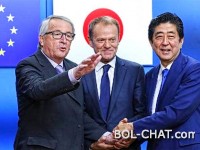A big turn: the EU and Japan turned their back on America
The European Union and Japan will sign a comprehensive trade agreement that will eliminate almost all customs duties
Japan hopes that strengthening ties with the EU will revive mutual direct investment, contribute to the fight against the global aspirations of others to protectionism and raise the reputation of Japanese brands, the Foreign Ministry said. The EU has announced that trade liberalization will lead to the growth of exports of chemical products, clothing, cosmetics and beer to Japan, which will secure jobs in Europe.
The Japanese will also receive cheaper cheeses from Europe, such as Parmesan, Gauda and Chedar, as well as chocolates and biscuits, according to AP. The agreement seeks to tackle the problems associated with trade tensions that arose following the actions of US President Donald Trump, AP reports. The signing of an agreement in Tokyo, which was largely founded last year, is ceremonial.
The agreement was due to be signed earlier this month, but it was postponed because Japanese Prime Minister Shinzo Abe canceled his departure to Brussels due to a disaster in the southwest of Japan caused by heavy precipitation, when more than 200 people lost their lives in floods and landslides. President of the European Council Donald Tusk and European Commission President Jean Claude Juncker, who arrived, will be guests at a gala dinner in the official residence of the Japanese Prime Minister.
Both sides highlight the importance of an agreement that includes a third of the global economy and a market with more than 600 million people. It will allow lower prices for European wines and pork for Japanese consumers, while Europeans will become cheaper Japanese diaries for machines, tea and fish. The agreement abolishes about 99 percent of import tariffs for Japanese goods in the EU and so far about 94 percent of customs duties on European imports from Japan, but in the coming years this percentage will rise to 99 percent.
The current tariff difference is a consequence of the exceptions made to some goods, such as rice, a culturally and politically sensitive product that Japan has been protecting for decades.
- 18 Jul, 2018
- 2641 views
- No comments


